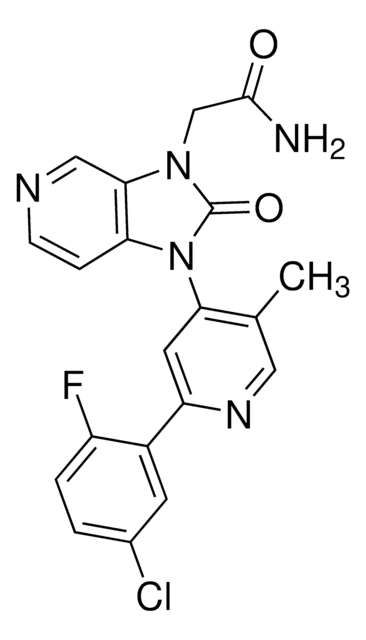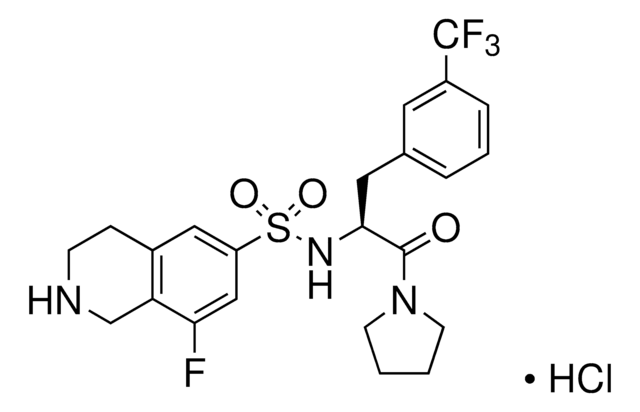382115
Histone Acetyl Transferase Inhibitor VII, CTK7A
The Histone Acetyl Transferase Inhibitor VII, CTK7A controls the biological activity of Histone Acetyl Transferase. This small molecule/inhibitor is primarily used for Cell Structure applications.
Sinónimos:
Histone Acetyl Transferase Inhibitor VII, CTK7A, HAT Inhibitor VII, p300/CBP Inhibitor V, PCAF Inhibitor III, Sodium-4-(3,5-bis(4-hydroxy-3-methoxystyryl)-1H-pyrazol-1-yl)benzoate, HBC, Na, Sodium-4-(3,5-bis(4-hydroxy-3-methoxystyryl)-1H-pyrazol-1-yl)benzoate, HBC, Na, HAT Inhibitor VII, p300/CBP Inhibitor V, PCAF Inhibitor III
About This Item
Productos recomendados
Quality Level
assay
≥99% (HPLC)
form
powder
manufacturer/tradename
Calbiochem®
storage condition
OK to freeze
protect from light
color
tan
solubility
DMSO: 100 mg/mL
shipped in
ambient
storage temp.
−20°C
SMILES string
OC1=CC=C(C=C1OC)/C=C/C2=CC(/C=C/C3=CC=C(O)C(OC)=C3)=NN2C4=CC=C(C=C4)C(O[Na])=O
General description
Packaging
Warning
Other Notes
Shim, J.S., et al. 2004. Chem. Biol.11, 1455.
Shim, J.S., et al. 2002. Bioorg. Med. Chem. Biol.10, 2439.
Legal Information
Storage Class
11 - Combustible Solids
wgk_germany
WGK 2
flash_point_f
Not applicable
flash_point_c
Not applicable
Certificados de análisis (COA)
Busque Certificados de análisis (COA) introduciendo el número de lote del producto. Los números de lote se encuentran en la etiqueta del producto después de las palabras «Lot» o «Batch»
¿Ya tiene este producto?
Encuentre la documentación para los productos que ha comprado recientemente en la Biblioteca de documentos.
Nuestro equipo de científicos tiene experiencia en todas las áreas de investigación: Ciencias de la vida, Ciencia de los materiales, Síntesis química, Cromatografía, Analítica y muchas otras.
Póngase en contacto con el Servicio técnico






